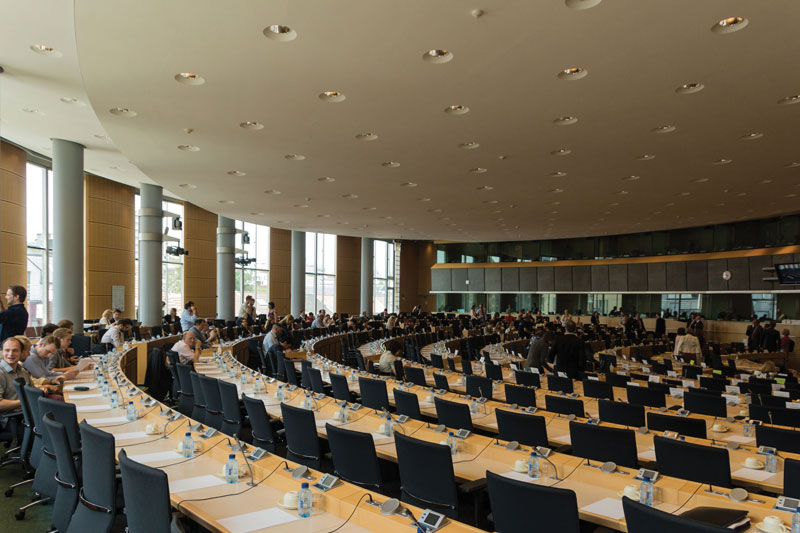
Britain's farming unions are calling on European politicians to protect the country's egg producers in any European Union trade deals with other countries.
The National Farmers' Union (NFU), together with the farming unions of Scotland, Wales and Northern Ireland, made the appeal in a manifesto produced ahead of the May elections to the European Parliament. The ballot is being held to directly elect more than 700 MEPs to the European Parliament and the farming unions produced the manifesto to put their case to those seeking election.
“We are calling on members of the European Parliament to help maximise the potential of our industry and create a policy environment in which our farmers and growers can thrive," said NFU president Meurig Raymond.
One of the issues raised in the manifesto was that of international trade and the negotiations currently taking place between the European Union and a number of other countries. "The EU is in the process of negotiating preferential trade agreements with an unprecedented number of third country partners," said the unions in the document. "According to the European Commission, if it were to complete all its current free trade talks tomorrow, this would add 2.2 per cent or €275 billion to the GDP of the EU. This is the equivalent of adding a country as big as Austria or Denmark to the EU economy. We strongly believe that the EU should seek balanced trade agreements and should there be negative impacts, it is appropriate for farmers to be compensated through adjustment mechanisms. Some trade agreements are likely to benefit UK agriculture by expanding the opportunities for exports. However, freeing up trade may also make it more difficult for some UK farmers to compete with imports."
The United Kingdom egg industry has expressed concern that any agreements should include some protection for European egg producers, who are required by EU regulation to abide by higher welfare standards. A regulation banning the use of conventional battery cages came into force on January 1 2012. The fear is that if trade deals are signed with countries with lower welfare standards, European egg producers would be unable to compete with the price of imported egg.
One potential trade deal under discussion would create a Transatlantic trading agreement with the United States. It is understood that European Union negotiators are seeking sensitive product status for eggs in their talks with their American counterparts. It would mean that a quota would apply to the number of eggs that could enter the EU tariff free. Egg imports above the agreed quota would be subject to tariffs in the normal way. Current EU trade commissioner Karel De Gucht has been quoted as saying that the aim of the Transatlantic Trade and Investment Partnership (TTIP) was "beyond simply reducing tariffs across the board - is to make the EU and the US regulatory systems more compatible and to help shape global rules in trade." He said, “The reality is that over the last decades, Europe has seen its standards rise to a level of global excellence and leadership. And it's on this basis that both sides agree to use such a transformative process to raise their game.”
In their Euro election manifesto, the UK farming unions are seeking to ensure that MEPs who sit in the newly elected European Parliament recognise the importance of protecting European producers from unfair competition. They said in the document, "As farming unions it is therefore important to us that:
• The impact of prospective trade agreements is clearly understood
• The degree of equivalency in food safety, traceability, environmental and animal welfare standards which farmers are required to meet to supply the EU market is properly assessed
• The EU must be able to maintain safeguard measures for all products if exceptional market circumstances require such action."
They said, "We would like MEPs to support our calls to have some products, specifically animal products such as meat and eggs, treated as 'sensitive' in the negotiations. We would also like the support of MEPs in fighting for the improvement of rules relating to the protection of products from certain areas of the EU - the products of ‘specific geographical indication’ - and allowing the EU to maintain the right to establish higher standards on the basis of sound scientific justification or risk assessment processes."
The issue of unfair competition has already caused some controversy. Although the use of battery cages is now banned in the EU, battery eggs from Ukraine are being allowed into EU states as a result of a trade agreement with the Eastern European country.
Demands have been growing for animal welfare to be considered in any future trade agreements. Robert Gooch, policy director with the British Free Range Egg Producers' Association (BFREPA) previously told the Ranger, "I think there is going to be more and more pressure for welfare rules to be included in global and bilateral talks in the future because more consumers around the world are becoming more concerned about animal welfare."
At the launch of the Euro election manifesto, NFU president Meurig Raymond said, "We are urging candidates for the European Parliament elections to support sustainable and competitive food production. To achieve this, investment in the sector must be stepped up significantly, research and innovation encouraged and policy formulated based on sound science. Safeguarding the environment must go hand in hand with agricultural production and the food chain also needs to work better to enable farmers to get a better return from the market. We also believe that fair and balanced free trade agreements with global partners are crucial.
“UK agriculture is good for the economy, for the environment, for growth and employment and ensures quality food supplies for consumers not just in the UK but across the world. European policies and legislation play a major part in shaping the framework in which farming operates. We look forward to working closely with MEPs for the next parliamentary term and beyond.”
